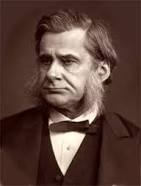Thomas Huxley
 | Thomas Henry Huxley (4 May 1825 - 29 June 1895) was an English biologist (comparative anatomist), known as "Darwin's Bulldog" for his advocacy of Charles Darwin's theory of evolution. Huxley's famous 1860 debate with Samuel Wilberforce was a key moment in the wider acceptance of evolution, and in his own career. Huxley had been planning to leave Oxford on the previous day, but, after an encounter with Robert Chambers, the author of Vestiges, he changed his mind and decided to join the debate. Wilberforce was coached by Richard Owen, against whom Huxley also debated whether humans were closely related to apes. Huxley was slow to accept some of Darwin's ideas, such as gradualism, and was undecided about natural selection, but despite this he was wholehearted in his public support of Darwin. He was instrumental in developing scientific education in Britain, and fought against the more extreme versions of religious tradition. In 1869 Huxley coined the term 'agnostic' to describe his own views on theology, a term whose use has continued to the present day. Huxley had little formal schooling and taught himself almost everything he knew. He became perhaps the finest comparative anatomist of the latter 19th century. He worked on invertebrates, clarifying relationships between groups previously little understood. Later, he worked on vertebrates, especially on the relationship between apes and humans. After comparing Archaeopteryx with Compsognathus, he concluded that birds evolved from small carnivorous dinosaurs, a theory widely accepted today. The tendency has been for this fine anatomical work to be overshadowed by his energetic and controversial activity in favour of evolution, and by his extensive public work on scientific education, both of which had significant effects on society in Britain and elsewhere. From Wikipedia |
Aphorisms and Reflections (1907)
"As a natural process, of the same character as the development of a tree from its seed, or of a fowl from its egg, evolution excludes creation and all other kinds of supernatural intervention."
[This is quoted by Sean Carroll on p7 of his "Endless Forms Most Beautiful" with the appearance of agreement with Huxley in eliminating any idea of creation. Huxley may plausibly have inferred from his study that there is no apparent necessity for major "magic wand" events in the process of development, but his statement is much more global and absolute than his data warrant. The phrase "excludes creation and all other kinds" is clearly a personal philosophical statement that is not warranted by his data.]
"The student of Nature wonders the more and is astonished the less, the more conversant he becomes with her operations; but of all the perennial miracles she offers to his inspection, perhaps the most worth of admiration is the development of a plant or of an animal from its embryo."
"science warns me to be careful how I adopt a view which jumps with my preconceptions, and to require stronger evidence for such beliefs than for one to which I was previously hostile." [This is quoted by Sean Carroll on p46 of his "The Making of the Fittest" ]
| Windows of Creation |
| Evidence from nature |